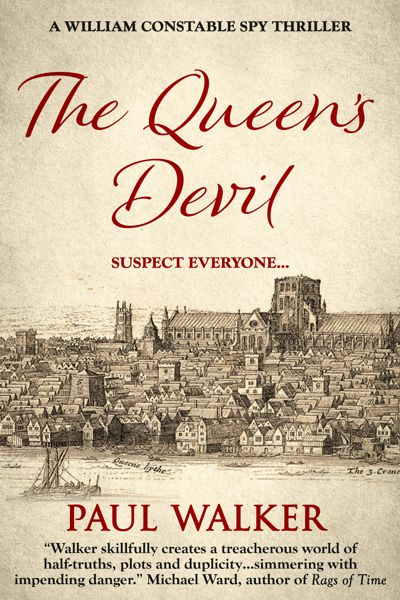
1583.
William Constable, recently married astrologer and mathematician, has settled into routine work as a physician when he is requested to attend two prisoners in the Tower of London. Both are accused of separate acts treason, but their backgrounds suggest there may be a connection.
Sir Francis Walsingham and Lord Burghley urge William to discover further intelligence from the prisoners while tending their injuries from torture. The agent’s investigations lead him to the French Embassy, which lies at the heart of a conspiracy which threatens the nation. Through his enquiries, an unsuspecting William becomes entangled in a perilous web of politicking and religious fervour. The threat comes from one the most powerful men in the English court – one referred to as the Queen’s Devil. William faces a race against time to unpick these ties, climaxing in a daring raid on the Embassy.
Praise for Paul Walker:
“Walker skilfully creates a treacherous world of half-truths, plots and duplicity… simmering with impending danger.” Michael Ward, author of Rags of Time.
“A gripping and evocative page-turner that vibrantly brings Elizabeth’s London to life.” Steven Veerapen, author of A Dangerous Trade.
“Full of convincing characters both historical and imagined.” Peter Tonkin
MY REVIEW:
William Constable seemed to me an unlikely spy, which I guess is why he was so good at it. He was a moral man, in some ways almost an innocent, and seemed quite vulnerable to evil forces that stopped at nothing to get their way. One wonders who was more degenerate in this Elizabethan Game of Thrones. Were they the villains who mistakenly thought he harbored damning letters against the Earl of Leicester and were quite willing to ruin his life if he didn’t turn them over? Or did the men who hired him to spy on damned and tortured prisoners—while tending to their injuries—show even fewer scruples? Either way, William was an unwilling participant in these unsavory schemes. Or maybe not. He certainly allowed himself to be dragged into the prisoner scam and he did seem to enjoy the stimulation associated with danger. That is, until he was himself thrown into Newgate while his wife was dragged to prison under an accusation of witchcraft. His powerful employers—the queen’s men—didn’t seem all that concerned that he and his wife were in mortal danger. He was pretty much on his own, and resorted to his own set of questionable activities to save his wife’s life. I think this combination of circumstances would deter any sane person from playing in these troubled waters.
Why should a brief mention of a conspiracy have affected me in this way? Am I so faint-hearted that thoughts of strong questioning on an unknown man pester my sleep? After all, such matters are commonplace enough in these times. And Walsingham? Do I dread his call, or have I missed the grip of peril and excitement experienced as one of his intelligencers? Reasoning tells me I am content with the routine of a physician and doting husband. Yet, I cannot discount there may be a yearning for a sharper edge to my life. These matters are unresolved in my mind as we turn from Ludgate Hill into Shoe Lane.
Oh well, the good doctor could be his own worst enemy. This is the first William Constable book I read; yes, it is a stand-alone and with my working knowledge of Elizabethan England, I had no trouble following it. Though this is the first time I encountered the Earl of Leicester as a total scoundrel; maybe that’s how other people saw him—all but the queen, of course. We don’t meet Elizabeth in this story, so we don’t get her point of view. There were a lot of characters and subplots in this novel and I had a hard time reconciling the two major threads (the prisoners in the Tower and Earl’s wife who sought the missing letters). The total disregard for the law among the ruling class was very hard for me to stomach and I admit to a lot of squeamishness while reading about the hopelessness of poor souls caught in webs of courtly intrigues. I raced through to the end, which may be why I missed some connections; it could well be my fault as an incautious reader. I will say the prose is seamless and flowed very well. There’s enough movement to keep the story from ever slowing down.

Buy Link: https://books2read.com/u/mBG7rv
MEET PAUL WALKER

Paul is married and lives in a village 30 miles north of London. Having worked in universities and run his own business, he is now a full-time writer of fiction and part-time director of an education trust. His writing in a garden shed is regularly disrupted by children and a growing number of grandchildren and dogs.
Paul writes historical fiction. He inherited his love of British history and historical fiction from his mother, who was an avid member of Richard III Society. The William Constable series of historical thrillers is based around real characters and events in the late sixteenth century. The first two books in the series – State of Treason and A Necessary Killing – were published in 2019. The third book, titled The Queen’s Devil, was published in the summer of 2020.
Connect with Paul:
Twitter • Facebook • Amazon Author Page.
Thank you so much for hosting the blog tour for The Queen’s Devil. Your post looks beautiful – as always!